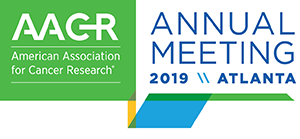 Scientists and physicians from around the world met at AACR 2019 in Atlanta, Georgia from March 29 to April 3 to learn about the latest discoveries across the spectrum of cancer research. The meeting covered a wide range of topics, including population science, prevention, cancer biology, translational and clinical studies, and survivorship and advocacy. This annual conference highlights the best international work in research and medicine.
Scientists and physicians from around the world met at AACR 2019 in Atlanta, Georgia from March 29 to April 3 to learn about the latest discoveries across the spectrum of cancer research. The meeting covered a wide range of topics, including population science, prevention, cancer biology, translational and clinical studies, and survivorship and advocacy. This annual conference highlights the best international work in research and medicine.
Katherine Ferrara, PhD, from Stanford University, presented the latest data from her groundbreaking cancer immunotherapy work. Her group presented two abstracts, including “Combining activatable nanodelivery with immunotherapy in a murine breast cancer model,” which has now been published in the Journal of Controlled Release. The Lyerly Laboratory at Duke University presented their focused ultrasound plus cancer immunotherapy work, which was also carried out in a breast cancer model.
“There were several areas of particular interest for those of us exploring combinations of focused ultrasound and immunotherapy,” said Dr. Ferrara. “For example, a plenary session by E. John Wherry included his work demonstrating that reducing tumor burden enhances immunotherapy outcomes.” (See the publication in Nature.) Dr. Ferrara continued, “Other promising work included preliminary results from a Parker Institute for Cancer Immunotherapy clinical trial [NCT03214250], which showed that agonist CD40 treatment is improving treatment response in patients with pancreatic cancer. Finally, sessions on human intratumoral immunotherapy administration included promising data for the creation of distant responses using locally-administered immunotherapy.” (Read about the abscopal effect.)
Focused Ultrasound Session
Session MW10 – Novel Imaging Strategies in the Metastatic Niche
Presentation: “Multi-modal imaging and therapeutic delivery in cancer,” by Katherine Ferrara, PhD
Session Description: While there have been major advances in successfully battling cancer, especially with immunotherapy, metastasis remains a critical unmet need for most solid tumors. Compelling questions around the effects of tissue-specific differences in response to therapy, heterogeneity between primary tumors and distant metastases, and the role of spatiotemporal dynamics in shaping an effective antitumor response still remain unanswered. This session will focus on novel imaging strategies as instrumental in answering these questions. We will first examine how ex vivo live imaging of the lung metastatic niche enables immuno-oncology drug discovery in mouse models of breast cancer. Next, we will gain intravital microscopy insights in niche-dependent and niche-independent metastatic growth in the evolution of colorectal cancer. We will then focus on multimodal imaging to visualize and deliver therapy to metastases. Finally, we will learn about utilizing hyperpolarized 13C-magnetic resonance spectroscopic imaging to study metabolic reprogramming during tumor progression and response to therapy.
Focused Ultrasound Abstracts
2171 / 22 – Activatable nanodelivery of high payload gemcitabine augments therapeutic efficacy in murine breast and pancreatic cancer models by Samantha T. Tucci, Azadeh Kheirolomoom, Elizabeth S. Ingham, Lisa M. Mahakian, Sarah M. Tam, Josquin Foiret, Neil E. Hubbard, Alexander D. Borowsky, Mo Baikoghli, R. Holland Cheng, and Katherine W. Ferrara from UC Davis, Davis, CA and Stanford University, Stanford, CA.
3952 / 8 – Localized nanodelivery combined with immunotherapy promotes curative anti-tumor responses in a murine breast cancer model by Azadeh Kheirolomoom, Matthew T. Silvestrini, Elizabeth S. Ingham, Lisa M. Mahakian, Sarah M. Tam, Spencer K. Tumbale, Josquin Foiret, Neil E. Hubbard, Alexander D. Borowsky, William J. Murphy, and Katherine W. Ferrara from UC Davis, Davis, CA and Stanford University, Stanford, CA.
4071 / 4 – A novel combination therapy of high intensity focused ultrasound and PDL1 blockades against advanced breast cancer by Shinya Abe, Takuya Osada, Kensuke Kaneko, Pei Zhong, and Herbert K. Lyerly from Duke University, Durham, NC.
